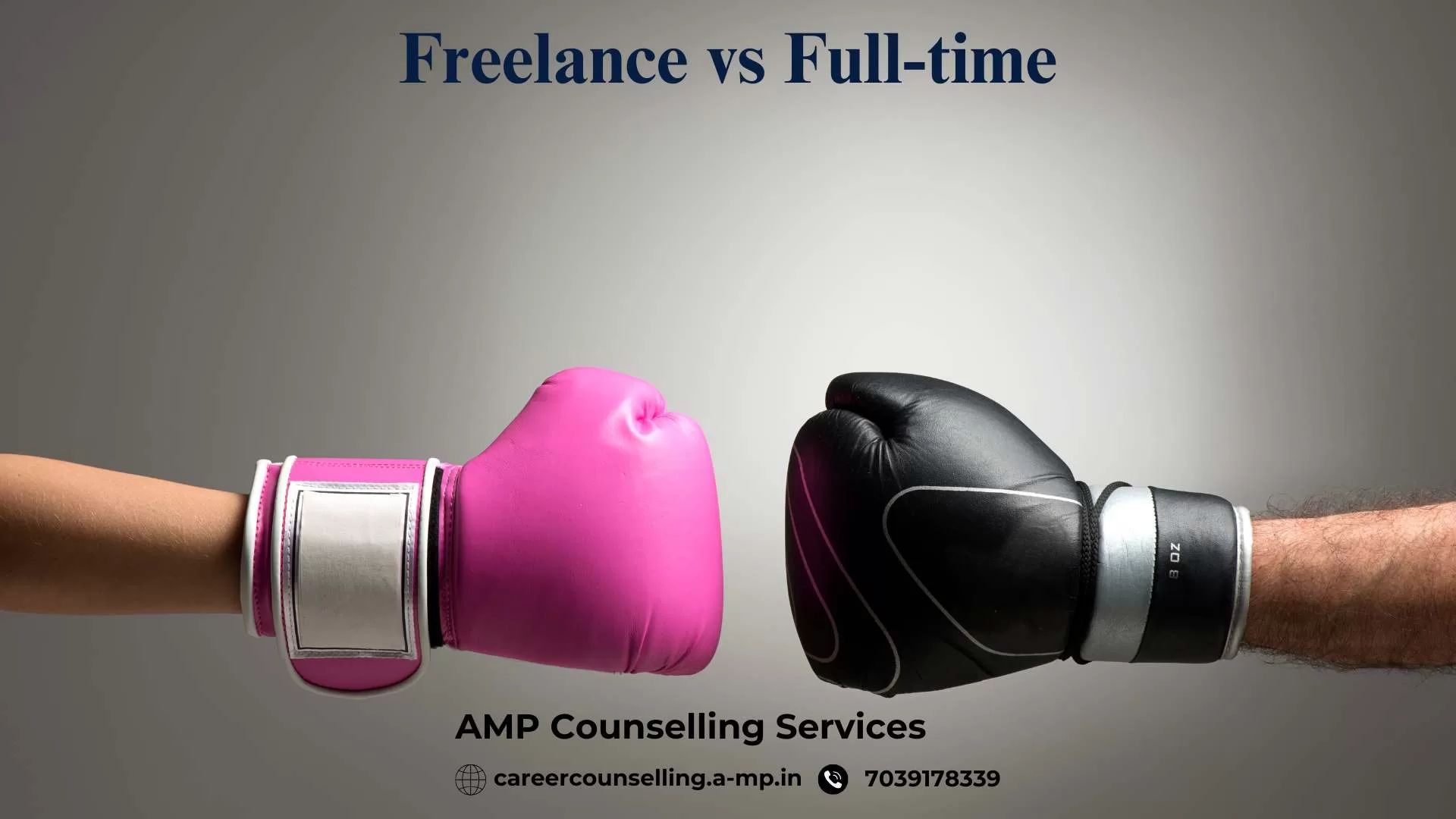Understanding the Basics: Freelance vs Full-Time
Before we dive into the details, let’s define what each option entails: Freelance Work involves self-employment. Freelancers offer services to clients on a contract or per-project basis. They often juggle multiple clients and enjoy more control over their schedules. Full-Time Employment means working for one employer, typically on a fixed schedule, with benefits such as health insurance, paid leave, and job security. Both paths have unique advantages and challenges. Let’s break them down.Flexibility vs Structure
One of the biggest differences in the freelance vs full-time debate is flexibility. Freelancers often enjoy flexible work hours. This is ideal for those who value autonomy, prefer working from different locations, or need a better work-life balance. Full-time employees usually follow a set schedule. While this offers routine and predictability, it may limit personal freedom during the workweek. AMP Counselling Center encourages clients to consider their lifestyle and personal commitments when weighing this aspect. For parents, students, or those with caregiving responsibilities, freelancing might offer the flexibility they need.Income Potential: Stability vs Opportunity
Another crucial factor in the freelance vs full-time discussion is income. Freelancers have the potential to earn more, especially if they build a strong client base and develop in-demand skills. However, income can be inconsistent, especially in the beginning. Full-time jobs typically offer stable salaries. You’ll know exactly how much you’re earning each month, which makes budgeting easier. In addition, benefits like paid time off and retirement plans add long-term value. If financial stability is your top priority, full-time work may be more suitable. On the other hand, if you’re willing to navigate initial challenges, freelancing offers greater earning potential over time.Career Growth and Skill Development
The path you choose can significantly influence your career trajectory. Freelancers must continually learn and adapt. They often wear multiple hats — marketer, accountant, project manager — which helps them gain diverse skills quickly. However, they may lack access to structured mentorship or company-sponsored training. Full-time employees often receive regular training, performance reviews, and promotions. Companies may invest in their professional development, offering a clearer path to leadership roles. At AMP Counselling Center, we often advise clients to think long-term. Ask yourself: Where do you see your career in five years? Do you value independence more than climbing the corporate ladder?Work Environment: Independence vs Community
When debating freelance vs full-time, think about how you work best. Freelancers typically work alone, either from home or co-working spaces. This solitude can be liberating, but also isolating. Full-time jobs provide a structured work environment with team interaction. This can lead to better collaboration, shared goals, and a sense of belonging. Your personality type plays a big role here. Introverts might thrive as freelancers, while extroverts may miss the social aspects of a traditional workplace.Job Security and Benefits
This is where full-time employment often holds the upper hand. Full-time roles come with job security, medical benefits, paid holidays, and retirement contributions. These perks provide peace of mind, especially during personal or global crises. Freelancers are responsible for their own insurance, taxes, and retirement planning. While this offers freedom, it also demands more discipline and financial planning. If you’re risk-averse or have significant financial responsibilities, full-time work might be the safer bet. Mental Health Considerations: A Core Concern at AMP Counselling Center From a mental wellness perspective — which is at the heart of what we do at AMP Counselling Center — both paths can impact your mental health in different ways. Freelancers may face stress from financial uncertainty, lack of boundaries, or feelings of isolation. Full-time employees might experience burnout from long hours, office politics, or lack of autonomy. It’s essential to evaluate your stress triggers and mental health needs. If you’re unsure, speaking with a professional counselor (like those at AMP Counselling Center, contact us at 7039178339) can provide clarity and support.Freelance vs Full-Time: A Hybrid Approach?
Interestingly, the freelance vs full-time dilemma isn’t always black and white. Many professionals now explore hybrid careers — working full-time while freelancing on the side, or taking on contract work between full-time roles. This can be an ideal way to "test the waters" without fully committing to one path. It also allows for income diversification, which can be especially valuable in uncertain economic climates.So… Freelance or Full-Time?
Here are a few guiding questions to help you decide: Do I value stability or flexibility more? Am I comfortable managing my own business, or do I prefer structured support? What are my financial goals in the short and long term? How important are benefits like health insurance and retirement plans to me? How does each option affect my mental health and overall well-being? There’s no one-size-fits-all answer. What works for one person may not suit another — and that’s perfectly okay.1. What’s the main difference between freelance and full-time work?
Freelancers work for themselves, taking on projects or clients on a contract basis. Full-time workers are employed by a company with a fixed salary, benefits, and a structured schedule.
2. Is freelancing better than working full-time?
That really depends on your lifestyle and goals! Freelancing offers more freedom and flexibility, while full-time work provides more stability and benefits. Neither is “better” — it’s about what suits you best.
3. Can I freelance and still have a full-time job?
Yes, absolutely. Many people freelance on the side while keeping a full-time job. It’s a great way to explore freelancing without giving up your steady income.
4. Do freelancers make more money than full-time employees?
They can, but it depends on the industry, experience, and how many clients you have. Freelancing has the potential for higher earnings, but income can also be inconsistent.

